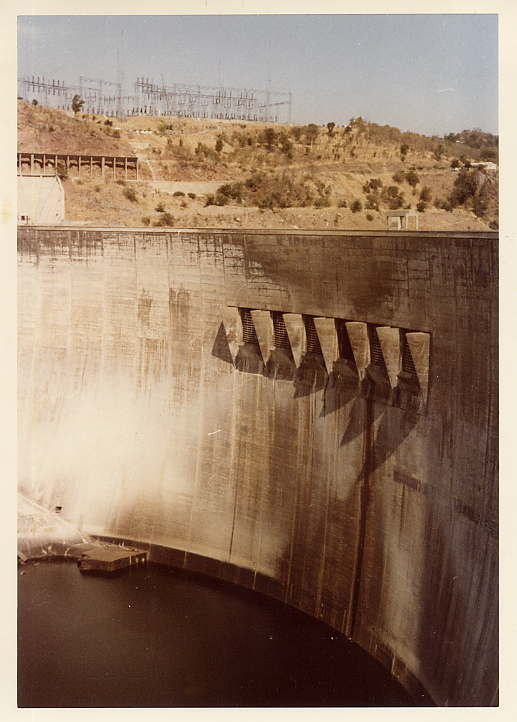Pinnacles of Success

Kariba Dam, the largest dam in the world, straddling the mighty Zambezi River between Southern and Northern Rhodesia, was opened in May 1960 by the Queen Mother
Pinnacles of Success
I recently visited Rhodes House, Oxford to research the book and also to celebrate the Queen’s 60th Jubilee along with an enthusiastic British public. Also in the news was of course the sudden decline of the European integration project. It seems to have happened in the same sort of time span as the decline of the Federation of Rhodesia and Nyasaland.
Pinnacles of Success
When the Royal family first visited Southern Rhodesia on their Victory Tour in 1947, the official commemorative book published, Southern Rhodesia Advances, saluted Rhodesia’s progress in its fifty six year history, replacing footpaths with strip roads and bridges. It outlined the slow but steady progress and the challenges of “civilizing the savages” so they could play a larger part in the economy of the country.
Kariba Dam, at the time the world’s largest, was built in record time in the remotest part of the country. It was opened in May 1960 by the Queen Mother, another flag waving event. The Federation was only seven years old.
One could be forgiven for presuming that the Federal Review by the British Government in December of that year was to acknowledge achievements and plan the future. It was held at Lancaster House, London and chaired by Macmillan, the British prime minister. To Sir Roy Welensky’s dismay, the British allowed it to be the stage for the two less developed northern colonial territories to make their plea for independence. Hastings Banda struck the conference dumb with ”And so Mr. Prime Minister, I beg of you, I plead with you, I exhort you, Let my people go.” You could have heard a pin drop.
Thereafter, Sir Edgar Whitehead’s Southern Rhodesian delegation began to meet separately, between Federal sessions, to discuss changes to the Southern Rhodesian Constitution, towards eliminating United Kingdom powers.
These talks continued in Salisbury in late January 1961 under the chairmanship of Duncan-Sandys, the Secretary of State for Commonwealth relations. The stumbling block to the new constitution was the franchise. Morris Hirsch, Whitehead’s constitutional advisor, presented a solution to the conference.
Sandys turned to Nkomo and asked, “Well Mr. Nkomo, what do you think of that? It seems a good basis to start on.”
“I don’t understand it. It’s much too complicated!”
Sandys immediately adjourned the meeting and asked the diminutive Jewish Dr. Hirsch to explain how it worked to the towering Matabele Nkomo and his advisers. They then conferred amongst themselves.
Nkomo came back to shake Hirsch’s hand, thanking him for providing the answer. “Given a reasonable education policy, we could have a black majority in a multiracial government (executive) in seven years.”
“There are many variables,” said Hirsch, “It’s possible, but more likely fifteen.”
Sandys and Whitehead had been unsuccessful in getting agreement of Harper (the leader of the opposition Dominion Party). They now asked Hirsch to tackle him.
But Hirsch’s pleadings failed. Personally, Harper admitted the merits of the constitution! But he said his party would have none of it and would throw him out if he did. Thus the Dominion Party missed an historic opportunity to support national unity.
Nevertheless an astonishing consensus had been achieved.
There is a tide in the affairs of men.
Which, taken at the flood, leads on to fortune;
Omitted, all the voyage of their life
Is bound in shallows and in miseries.
On such a full sea are we now afloat,
And we must take the current when it serves,
Or lose our ventures.
Julius Caesar Act 4, scene 3, Shakespeare
Disclosure: Dr. Morris Hirsch was my father.
